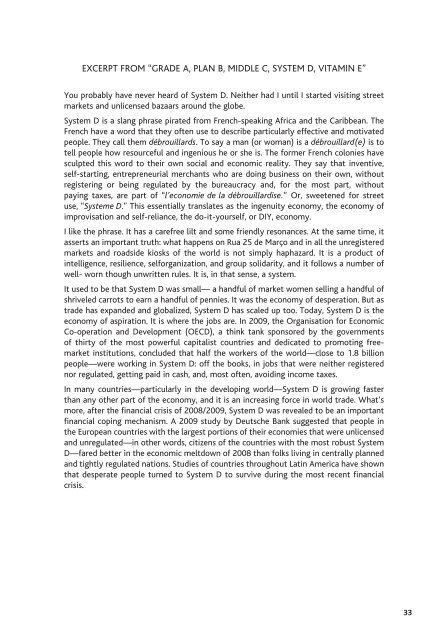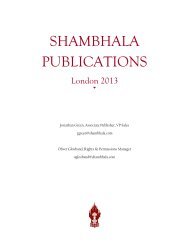Create successful ePaper yourself
Turn your PDF publications into a flip-book with our unique Google optimized e-Paper software.
EXCERPT FROM “GRADE A, PLAN B, MIDDLE C, SYSTEM D, VITAMIN E”<br />
You probably have never heard of System D. Neither had I until I started visiting street<br />
markets and unlicensed bazaars around the globe.<br />
System D is a slang phrase pirated from French-speaking Africa and the Caribbean. <strong>The</strong><br />
French have a word that they often use to describe particularly effective and motivated<br />
people. <strong>The</strong>y call them débrouillards. To say a man (or woman) is a débrouillard(e) is to<br />
tell people how resourceful and ingenious he or she is. <strong>The</strong> former French colonies have<br />
sculpted this word to their own social and economic reality. <strong>The</strong>y say that inventive,<br />
self-starting, entrepreneurial merchants who are doing business on their own, without<br />
registering or being regulated by the bureaucracy and, for the most part, without<br />
paying taxes, are part of “l’economie de la débrouillardise.” Or, sweetened for street<br />
use, “Systeme D.” This essentially translates as the ingenuity economy, the economy of<br />
improvisation and self-reliance, the do-it-yourself, or DIY, economy.<br />
I like the phrase. It has a carefree lilt and some friendly resonances. At the same time, it<br />
asserts an important truth: what happens on Rua 25 de Março and in all the unregistered<br />
markets and roadside kiosks of the world is not simply haphazard. It is a product of<br />
intelligence, resilience, selforganization, and group solidarity, and it follows a number of<br />
well- worn though unwritten rules. It is, in that sense, a system.<br />
It used to be that System D was small— a handful of market women selling a handful of<br />
shriveled carrots to earn a handful of pennies. It was the economy of desperation. But as<br />
trade has expanded and globalized, System D has scaled up too. Today, System D is the<br />
economy of aspiration. It is where the jobs are. In 2009, the Organisation for Economic<br />
Co-operation and Development (OECD), a think tank sponsored by the governments<br />
of thirty of the most powerful capitalist countries and dedicated to promoting freemarket<br />
institutions, concluded that half the workers of the world—close to 1.8 billion<br />
people—were working in System D: off the books, in jobs that were neither registered<br />
nor regulated, getting paid in cash, and, most often, avoiding income taxes.<br />
In many countries—particularly in the developing world—System D is growing faster<br />
than any other part of the economy, and it is an increasing force in world trade. What’s<br />
more, after the financial crisis of 2008/2009, System D was revealed to be an important<br />
financial coping mechanism. A 2009 study by Deutsche Bank suggested that people in<br />
the European countries with the largest portions of their economies that were unlicensed<br />
and unregulated—in other words, citizens of the countries with the most robust System<br />
D—fared better in the economic meltdown of 2008 than folks living in centrally planned<br />
and tightly regulated nations. Studies of countries throughout Latin America have shown<br />
that desperate people turned to System D to survive during the most recent financial<br />
crisis.<br />
33






